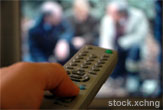Unhappy People Watch Lots More TV

Unhappy people glue themselves to the television 30 percent more than happy people. The finding, announced on Thursday, comes from a survey of nearly 30,000 American adults conducted between 1975 and 2006 as part of the General Social Survey.
While happy people reported watching an average of 19 hours of television per week, unhappy people reported 25 hours a week. The results held even after taking into account education, income, age and marital status. In addition, happy individuals were more socially active, attended more religious services, voted more and read a newspaper more often than their less-chipper counterparts. The researchers are not sure, though, whether unhappiness leads to more television-watching or more viewing leads to unhappiness. In fact, people say they like watching television: Past research has shown that when people watch television they enjoy it. In these studies, participants reported that on a scale from 0 (dislike) to 10 (greatly enjoy), TV-watching was nearly an 8. But perhaps the high from watching television doesn't last. "These conflicting data suggest that TV may provide viewers with short-run pleasure, but at the expense of long-term malaise," said researcher John Robinson, a sociologist at the University of Maryland, College Park. In this scenario, even the happiest campers could turn into Debbie-downers if they continue to stare at the boob-tube. The researchers suggest that over time, television-viewing could push out other activities that do have more lasting benefits. Exercise and sex come to mind, as do parties and other forms of socialization known to have psychological benefits. Or, maybe television is simply a refuge for people who are already unhappy. "TV is not judgmental nor difficult, so people with few social skills or resources for other activities can engage in it," Robinson and UM colleague Steven Martin write in the December issue of the journal Social Indicators Research. They add, "Furthermore, chronic unhappiness can be socially and personally debilitating and can interfere with work and most social and personal activities, but even the unhappiest people can click a remote and be passively entertained by a TV." The researchers say follow-up studies are needed to tease out the relationship between television and happiness.
- 5 Keys to Happiness
- 10 Technologies That Will Change Your Life
- Forget Crystal Balls: Let the Power of Math Inform Your Future
Sign up for the Live Science daily newsletter now
Get the world’s most fascinating discoveries delivered straight to your inbox.
Jeanna Bryner is managing editor of Scientific American. Previously she was editor in chief of Live Science and, prior to that, an editor at Scholastic's Science World magazine. Bryner has an English degree from Salisbury University, a master's degree in biogeochemistry and environmental sciences from the University of Maryland and a graduate science journalism degree from New York University. She has worked as a biologist in Florida, where she monitored wetlands and did field surveys for endangered species, including the gorgeous Florida Scrub Jay. She also received an ocean sciences journalism fellowship from the Woods Hole Oceanographic Institution. She is a firm believer that science is for everyone and that just about everything can be viewed through the lens of science.









